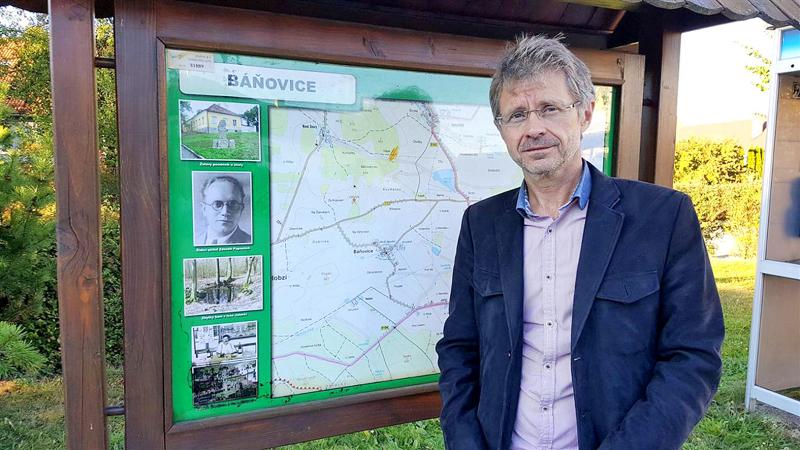The Czech Republic’s Senate on Wednesday passed a resolution that supports a possible visit by the senate president to Taiwan.
The resolution, initiated by Czech Senator Pavel Fischer, was passed with 50 votes in favor, one against and one abstention.
The resolution blasts Beijing for having its Prague embassy send a letter to former Czech Senate president Jaroslav Kubera earlier this year threatening repercussions for Czech businesses if he visited Taiwan.

Photo: Screen grab from Milos Vystrcil’s Facebook page
The resolution shows the Senate’s support for a visit to Taiwan by Senate President Milos Vystrcil, accompanied by Czech business representatives, as the visit would be in the diplomatic long-term interests of the Czech Republic, the resolution stated.
Vystrcil said he has yet to make a final decision on whether to visit Taiwan, but the more China issues threats, the more likely it is for him to visit.
Vystrcil’s predecessor, Kubera, who passed away on Jan. 20 at the age of 72, was a long-time supporter of Taiwan, and had been preparing to visit Taipei in February.
Following his death, Czech media made public the Chinese embassy’s threat toward Kubera.
Kubera’s family later said that the threat contributed to his death.
In March, Czech government officials, including Czech President Milos Zeman, Cabinet members and legislative leaders, issued a joint statement condemning China’s actions.
The statement also said that the Czech Republic intends to continue cooperating with Taiwan in the fields of economics and culture without contravening Beijing’s “one China” principle or breaking the country’s diplomatic ties with China.
Vystrcil said that his office received telephone calls from the Chinese embassy, warning him against congratulating President Tsai Ing-wen (蔡英文) on her second-term inauguration on Wednesday.
In Taipei, Minister of Foreign Affairs Joseph Wu (吳釗燮) said that the ministry would welcome a visit from a Czech politician.
Separately yesterday, Legislative Speaker Yu Shyi-kun (游錫堃) welcomed Vystrcil on Facebook, hoping that he would visit Taiwan after the pandemic eases.
While Zeman is considered a supporter of China, Czech Senate Vice President Miluse Horska, Prague Mayor Zdenek Hrib and Czech Chamber of Deputies member Marek Benda, who chairs the Czech Republic-Taiwan Friendship Group, sent their congratulations to Tsai in video clips.

NATIONAL SECURITY THREAT: An official said that Guan Guan’s comments had gone beyond the threshold of free speech, as she advocated for the destruction of the ROC China-born media influencer Guan Guan’s (關關) residency permit has been revoked for repeatedly posting pro-China content that threatens national security, the National Immigration Agency said yesterday. Guan Guan has said many controversial things in her videos posted to Douyin (抖音), including “the red flag will soon be painted all over Taiwan” and “Taiwan is an inseparable part of China,” while expressing hope for expedited “reunification.” The agency received multiple reports alleging that Guan Guan had advocated for armed reunification last year. After investigating, the agency last month issued a notice requiring her to appear and account for her actions. Guan Guan appeared as required,

A strong cold air mass is expected to arrive tonight, bringing a change in weather and a drop in temperature, the Central Weather Administration (CWA) said. The coldest time would be early on Thursday morning, with temperatures in some areas dipping as low as 8°C, it said. Daytime highs yesterday were 22°C to 24°C in northern and eastern Taiwan, and about 25°C to 28°C in the central and southern regions, it said. However, nighttime lows would dip to about 15°C to 16°C in central and northern Taiwan as well as the northeast, and 17°C to 19°C elsewhere, it said. Tropical Storm Nokaen, currently

‘NATO-PLUS’: ‘Our strategic partners in the Indo-Pacific are facing increasing aggression by the Chinese Communist Party,’ US Representative Rob Wittman said The US House of Representatives on Monday released its version of the Consolidated Appropriations Act, which includes US$1.15 billion to support security cooperation with Taiwan. The omnibus act, covering US$1.2 trillion of spending, allocates US$1 billion for the Taiwan Security Cooperation Initiative, as well as US$150 million for the replacement of defense articles and reimbursement of defense services provided to Taiwan. The fund allocations were based on the US National Defense Authorization Act for fiscal 2026 that was passed by the US Congress last month and authorized up to US$1 billion to the US Defense Security Cooperation Agency in support of the

PAPERS, PLEASE: The gang exploited the high value of the passports, selling them at inflated prices to Chinese buyers, who would treat them as ‘invisibility cloaks’ The Yilan District Court has handed four members of a syndicate prison terms ranging from one year and two months to two years and two months for their involvement in a scheme to purchase Taiwanese passports and resell them abroad at a massive markup. A Chinese human smuggling syndicate purchased Taiwanese passports through local criminal networks, exploiting the passports’ visa-free travel privileges to turn a profit of more than 20 times the original price, the court said. Such criminal organizations enable people to impersonate Taiwanese when entering and exiting Taiwan and other countries, undermining social order and the credibility of the nation’s